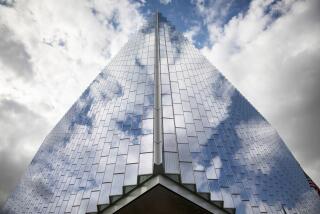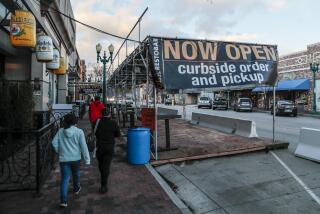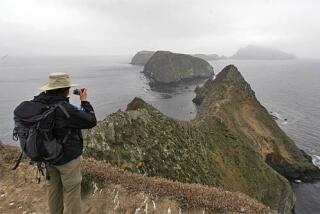Here are the latest coronavirus restrictions on beaches, hiking trails, parks, recreation spaces
The city of Los Angeles and other civic agencies announced new restrictions on movements due to the coronavirus.
They took the actions amid concerns over people continuing to jam trails, beaches and parks despite orders to stay home when possible and to practice social distancing.
Closures and bans
• Los Angeles city golf courses are closed.
• Parking lots at Venice Beach are closed as are all beach parking lots in Santa Monica.
• Organized group sports at Los Angeles city parks are banned.
• L.A. County Sheriff Alex Villanueva closed beach parking lots along Malibu’s 26 miles of coastline. Among the parking lots shut: Topanga, Surfrider, Corral Canyon, Point Dume, Zuma, El Matador, La Piedra, Nicholas Canyon and Leo Carrillo.
• The Mountains Recreation and Conservation Authority said it was closing all of its parks and trails, including parkland owned by the Santa Monica Mountains Conservancy. Access roads and parking lots also will be closed.
• Long Beach announced Sunday it was closing basketball courts, tennis courts, volleyball courts, dog parks, playgrounds, skate parks, picnic areas and banning group exercise in parks.
• San Diego closed parking lots at city parks and beaches.
• Marin County closed all its parks, including such iconic locations as Point Reyes National Seashore, Mount Tamalpais State Park, Muir Woods National Monument, and Point Bonita Lighthouse.
On Saturday, the Los Angeles County health officer issued a stronger so-called safer-at-home order.
The new county order largely matched the stronger issued for the city of Los Angeles by Mayor Eric Garcetti on Thursday night, just moments before the statewide order was announced.
Here’s what the latest Los Angeles County order does:
All businesses ordered shut, with exceptions
All businesses have been ordered to cease in-person operations and close to the public. There are exceptions for essential businesses, which are detailed below.
This new order is much stronger than the one issued just two nights earlier.
The county order issued Thursday night ordered only retail businesses that were not considered essential to shut.
As a result, the new order will require more businesses to close their physical premises — specifically, nonessential businesses that are not retail stores. People can still work from home.
All gatherings are banned
All public and private gatherings are prohibited anywhere within the jurisdiction of the Los Angeles County Department of Public Health, which, the order said, includes all unincorporated areas and cities in the county except Long Beach and Pasadena. Those cities have their own health departments and have issued their own orders.
Previously, only gatherings of 10 or more people were banned.
Nail and hair salons are ordered shut
On Thursday night, Los Angeles County had classified personal grooming services as an essential retail business exempt from an earlier order to close nonessential stores. On Saturday night, the county clarified that personal grooming services “are nonessential services that are closed.”
Long Beach on Friday also ordered shut personal grooming services, including hair salons, barbershops, nail salons , waxing services and spas.
Golf courses ordered shut
On Saturday morning, golfers took refuge in golf courses around the county. By Saturday night, the county said in a statement that golf courses are ordered closed.
Indoor malls and shopping centers
Indoor malls and shopping centers must shut.
Essential businesses in outdoor malls and shopping centers can remain open.
How essential businesses must operate
Essential businesses need to take the following precautions:
- Require customers, visitors and workers to be separated by 6 feet, to the extent feasible
- Provide hand sanitizer with at least 60% alcohol or hand-washing facilities with soap and water
- Post a sign at the entrance instructing people to go away if they have symptoms of illness, such as having a fever or cough
- Clean and sanitize the premises
Bars, gyms, movie theaters
Still closed.
Drive-in movie theaters
These are now closed.
Playgrounds
Indoor and outdoor playgrounds for children are ordered shut, except for those within child-care centers.
Flea markets and swap meets
Indoor and outdoor flea markets and swap meets are ordered shut.
Essential activities exempt from this order
- Visiting a health or veterinary care professional
- Obtaining medical supplies or medication
- Obtaining grocery items for your household or for delivery to others
- Legally mandated governmental purposes, such as access to court, social and administrative services
- Providing care for minors, the elderly, dependents, persons with disabilities or other vulnerable persons
- Complying with an order of law enforcement or the court
Essential businesses exempt from this order
- Grocery stores, certified farmers markets, farm and produce stands, supermarkets, food banks, convenience stores, warehouse stores and other establishments that sell canned food, dry goods, fresh produce, pet supplies, water, fresh meat, fish and poultry, and other household consumer products, including cleaning or personal care products. These include stores that sell non-grocery products needed to maintain the safety, sanitation and essential operations of homes.
- Food processors, confectioners, food packagers, food testing labs that are not open to the public and food cultivation, including farming, livestock and fishing.
- Organizations and businesses that provide food, shelter, social services and other necessities of life for the economically disadvantaged or otherwise needy individuals, including gang prevention and intervention, domestic violence and homeless service agencies.
- Newspapers, TV, radio, magazine, podcast and journalism activities.
- Gas station, auto supply, mobile auto repair operations, auto repair shops, bicycle repair shops and related facilities.
- Banks, credit unions, insurance companies and financial institutions.
- Plumbers, electricians, exterminators, custodians, janitors, handymen, funeral home workers, moving services, heating-ventilation-air conditioning installers, carpenters, vegetation services, tree maintenance, landscapers, gardeners, property managers, private security personnel and other service providers who provide services to maintain the safety, sanitation and essential operation to properties and other essential businesses.
- Businesses providing mailing and shipping services, including post office boxes.
- Educational institutions for the purposes of facilitating distance learning, providing meals for pickup or performing essential functions, as long as social distancing is practiced.
- Laundromats, dry cleaners and laundry service providers.
- Restaurants for delivery or takeout.
- Cafeterias, commissaries and restaurants within hospitals, nursing homes and other licensed care facilities may provide dine-in service, as long as social distancing is practiced.
- Firms that supply office or computer products needed by people who work from home.
- Businesses that supply other essential businesses with support or supplies needed to operate.
- Businesses that ship, truck or provide logistical support or deliver groceries, food, goods or services to residences, essential businesses, healthcare operations and essential infrastructure.
- Home-based care for seniors, adults, disabled persons or children.
- Residential facilities and shelters for homeless residents, disabled persons, seniors, adults, children and animals.
- Professional services, such as legal, payroll or accounting services, when needed to assist with legally mandated activities, and the permitting, inspection, construction, transfer and recording of ownership of housing, including residential and commercial real estate and anything incidental thereto.
- Military, defense contractors and federally funded research and development centers; essential personnel may leave their homes to provide any service or perform any work deemed essential for national security, including, but not limited to, defense, intelligence and aerospace development and manufacturing for the Department of Defense, intelligence community and NASA and other federal government agencies. Essential personnel include contractors.
- Child-care facilities providing services that enable employees exempted by this order to work. To the extent possible, child-care facilities must operate under the following mandatory conditions:
- Child care must be carried out in stable groups of 12 or fewer (“stable” means the same 12 or fewer children are in the same group each day).
- Children shall not change from one group to another.
- If more than one group of children is cared for at one facility, each group shall be in a separate room
- Groups shall not mix.
- Child-care providers shall remain solely with one group of children.
- Hotels, motels, shared rental units and similar facilities.
- Construction workers who support construction, operation, inspection and maintenance of construction sites and construction projects, including for housing.
Workers exempted from the state’s stay-at-home order
The state exempted workers in 16 sectors from California’s stay-at-home order.
More to Read
Sign up for Essential California
The most important California stories and recommendations in your inbox every morning.
You may occasionally receive promotional content from the Los Angeles Times.












